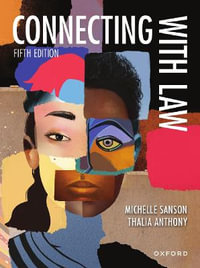William E. Nelson here proposes a new beginning in the study of colonial legal history. Examining all archival legal material for the period 1607-1776 and synthesizing existing scholarship in a four-volume series, The Common Law in Colonial America shows how the legal systems of Britain's thirteen North American colonies--initially established in response to divergent political, economic, and religious initiatives--slowly converged into a common American legal order that differed substantially from English common law.
Drawing on groundbreaking and overwhelmingly in-depth research into local court records and statutes, the first volume explores how the law of the Chesapeake colonies--Virginia and Maryland--diverged sharply from the New England colonies--Massachusetts Bay, Connecticut, New Haven, Plymouth, and Rhode Island--and traces the roots of these dissimilarities from their initial settlement until approximately 1660. Nelson pointedly examines the disparate motives of the legal systems in the respective colonies as they dealt with religion, price and labor regulations, crimes, public morals, the status of women, and the enforcement of contractual obligations. He reveals how Virginians' zeal for profit led to a harsh legal framework that efficiently squeezed payment out of debtors and labor out of servants; whereas the laws of Massachusetts were primarily concerned with the preservation of local autonomy and the moral values of family-centered farming communities. The law in the other New England
colonies, Nelson argues, gravitated towards the Massachusetts model, while Maryland's law, gravitated toward that of Virginia.
Comprehensive, authoritative, and extensively researched, The Common Law in Colonial America, Volume 1: The Chesapeake and New England, 1607-1660 is the definitive resource on the beginnings of the common law and its evolution during this vibrant era in America's history. William E. Nelson here proposes a new beginning in the study of colonial legal history.
Industry Reviews
"In a rigorous and original analysis, Nelson's The Common Law in Colonial America brings to life the complex and fascinating origins of American law. As Nelson quite brilliantly reveals, the early colonists struggled to make sense of law, religion, sex, crime, and economics in a harsh, challenging and often forbidding New World."--Geoffrey R. Stone, author of Perilous Times: Free Speech in Wartime: From the Sedition Act of 1798 to the War on
Terrorism
"Nelson's conception of The Common Law in Colonial America is magisterial, and only he has the knowledge and capacity to produce a synthesis at such length and depth. His first volume brilliantly sums up what the first generation of historically trained scholars of early American law have learned, and places it in an analytical context that is easy to comprehend, yet subtle and original."--Stanley N. Katz, coeditor of Colonial America: Essays in
Politics and Social Development
"Nelson's The Common Law in Colonial America begins a sweeping multi-volume revision of the way we understand our nation's legal foundations. With exhaustive research and the perspective of a master historian and legal scholar, he demonstrates how the earliest years of settlement shaped the future of American law and bequeathed to us a system that accommodates diversity within a common commitment to the basic concepts of the rule of law."--David T.
Konig, author of Law and Society in Puritan Massachusetts: Essex County, 1629-1692
"In his innovative analysis of legal culture in the early colonies, Nelson boldly discards the framework of reception in favor of intercolonial comparison. The result is a thoroughly researched compendium of case law that reveals how the rule of law evolved as a check on arbitrary magisterial power. It should prove valuable to both legal and social historians."--Marylynn Salmon, author of Women and the Law of Property in Early America
"In a rigorous and original analysis, Nelson's The Common Law in Colonial America brings to life the complex and fascinating origins of American law. As Nelson quite brilliantly reveals, the early colonists struggled to make sense of law, religion, sex, crime, and economics in a harsh, challenging and often forbidding New World."--Geoffrey R. Stone, author of Perilous Times: Free Speech in Wartime: From the Sedition Act of 1798 to the War on
Terrorism
"Nelson's conception of The Common Law in Colonial America is magisterial, and only he has the knowledge and capacity to produce a synthesis at such length and depth. His first volume brilliantly sums up what the first generation of historically trained scholars of early American law have learned, and places it in an analytical context that is easy to comprehend, yet subtle and original."--Stanley N. Katz, coeditor of Colonial America: Essays in
Politics and Social Development
"Nelson's The Common Law in Colonial America begins a sweeping multi-volume revision of the way we understand our nation's legal foundations. With exhaustive research and the perspective of a master historian and legal scholar, he demonstrates how the earliest years of settlement shaped the future of American law and bequeathed to us a system that accommodates diversity within a common commitment to the basic concepts of the rule of law."--David T.
Konig, author of Law and Society in Puritan Massachusetts: Essex County, 1629-1692
"In his innovative analysis of legal culture in the early colonies, Nelson boldly discards the framework of reception in favor of intercolonial comparison. The result is a thoroughly researched compendium of case law that reveals how the rule of law evolved as a check on arbitrary magisterial power. It should prove valuable to both legal and social historians."--Marylynn Salmon, author of Women and the Law of Property in Early America
























